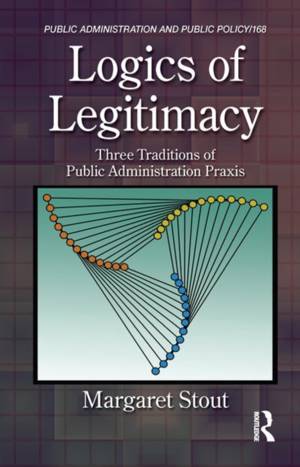
- Afhalen na 1 uur in een winkel met voorraad
- Gratis thuislevering in België vanaf € 30
- Ruim aanbod met 7 miljoen producten
- Afhalen na 1 uur in een winkel met voorraad
- Gratis thuislevering in België vanaf € 30
- Ruim aanbod met 7 miljoen producten
Omschrijving
The discipline of public administration draws predominantly from political and organizational theory, but also from other social and behavioral sciences, philosophy, and even theology. This diversity results in conflicting prescriptions for the "proper" administrative role. So, how are those new to public administration to know which ideas are "legitimate"?
Rather than accepting conventional arguments for administrative legitimacy through delegated constitutional authority or expertise, Logics of Legitimacy: Three Traditions of Public Administration Praxis does not assume that any one approach to professionalism is accepted by all scholars, practitioners, citizens, or elected representatives. Instead, it offers a framework for public administration theory and practice that fully includes the citizen as a political actor alongside elected representatives and administrators. This framework:
- Considers both direct and representative forms of democracy
- Examines concepts from both political and organizational theory, addressing many of the key questions in public administration
- Examines past and present approaches to administration
- Presents a conceptual lens for understanding public administration theory and explaining different administrative roles and practices
The framework for public administration theory and practice is presented in three traditions of main prescriptions for practice: Constitutional (the bureaucrat), Discretionary (the entrepreneur), and Collaborative (the steward). This book is appropriate for use in graduate-level courses that explore the philosophical, historical, and intellectual foundations of public administration. Upon qualified course adoption, instructors will gain access to a course outline and corresponding lecture slides.
Specificaties
Betrokkenen
- Auteur(s):
- Uitgeverij:
Inhoud
- Aantal bladzijden:
- 325
- Taal:
- Engels
- Reeks:
- Reeksnummer:
- nr. 167
Eigenschappen
- Productcode (EAN):
- 9781466511613
- Verschijningsdatum:
- 26/07/2012
- Uitvoering:
- Hardcover
- Formaat:
- Genaaid
- Afmetingen:
- 157 mm x 236 mm
- Gewicht:
- 612 g

Alleen bij Standaard Boekhandel
Beoordelingen
We publiceren alleen reviews die voldoen aan de voorwaarden voor reviews. Bekijk onze voorwaarden voor reviews.











